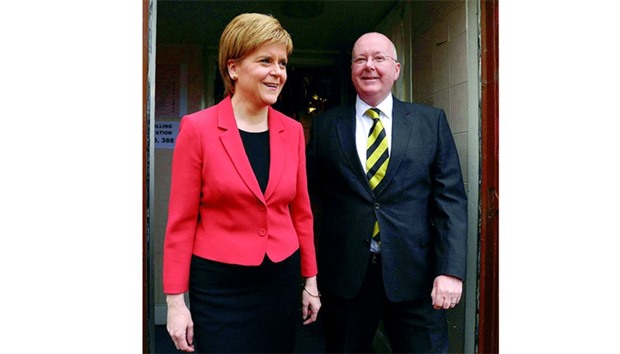Labour candidate Sadiq Khan was yesterday set to become the first Muslim to be elected mayor of London, loosening the ruling Conservatives’ hold on Britain’s financial centre after a campaign marred by charges of anti-Semitism and extremism.
His expected victory may be a lone bright spot for Labour on a day of local elections in England, Scotland and Wales. Opinion polls suggested the main opposition party would lose seats in some traditional strongholds, testing the authority of its new left-wing leader, Jeremy Corbyn.
In bright sunshine, Britons trickled in to voting stations to cast their ballots in elections which some campaigners fear could fail to attract many voters, as the contests have been overshadowed by next month’s referendum on whether Britain should leave the European Union.
The fight to run London - the top prize in the local elections - has pitted Labour’s Khan, 45, the son of an immigrant bus driver, against Conservative Zac Goldsmith, 41, the elite-educated son of a billionaire financier.
The winner will replace Conservative Boris Johnson, who has run the city of 8.6mn people for the past eight years and is seen as a leading contender to succeed David Cameron as party leader and prime minister.
Khan has a big lead in the opinion polls, despite accusations by Goldsmith that he has shared platforms with radical speakers and given “oxygen” to extremists.
“Yes Goldsmith’s argument on the radio made me distrust him ... I am absolutely amazed how he tried to smear by innuendo,” said self-employed voter Ian Whisson, describing the Conservative candidate’s campaign as “disgusting and slimy”.
Goldmith denies the charge, saying he has raised legitimate questions over his opponent’s judgment.
The campaign, condemned by Labour for using what it calls Donald Trump-style tactics to divide Londoners along faith lines, has swept aside usual concerns in the capital over high transport costs and a lack of affordable housing.
On the eve of the vote, Prime Minister Cameron and Labour leader Corbyn went head-to-head over Khan and Goldsmith’s campaigns in a heated parliamentary debate.
Khan says he has fought extremism all his life and that he regrets sharing a stage with speakers who held “abhorrent” views.
But the former human rights lawyer has also had to distance himself from Corbyn after a row over anti-Semitism.
The Labour leader ordered an inquiry into charges of anti-Semitism after suspending Ken Livingstone, a political ally and a former London mayor, for saying Adolf Hitler had supported Zionism.
Khan was quick to condemn the comments.
Although people out in the capital said the row had done little to change their view of the Labour candidate for mayor, others said they had become disenchanted with the party itself.
“Yes it has affected my view of Labour, it’s very disappointing,” said Sylvie Edge, a 60-year-old photographer, as she cast her ballot in Shoreditch in central London.
Corbyn risks losing dozens of seats in some of Labour’s traditional strongholds in his first major electoral test since being elected party leader in September on a wave of enthusiasm for change and an end to ‘establishment politics’.
After Corbyn expressed confidence that Labour would gain seats, his spokesman qualified his remarks yesterday, saying he rather wanted to say: “We’re not in the business of losing seats and we’ll be fighting to win as many as possible tomorrow.”

Scotland’s First Minister and leader of the Scottish National Party (SNP), Nicola Sturgeon, and her husband Peter Murrell leave a polling station at Broomhouse Community Hall in east Glasgow yesterday after casting their ballot papers to vote. With London choosing a new mayor, elections to the Scottish, Welsh and Northern Irish assemblies, and 124 local authorities scattered across England were also held.
